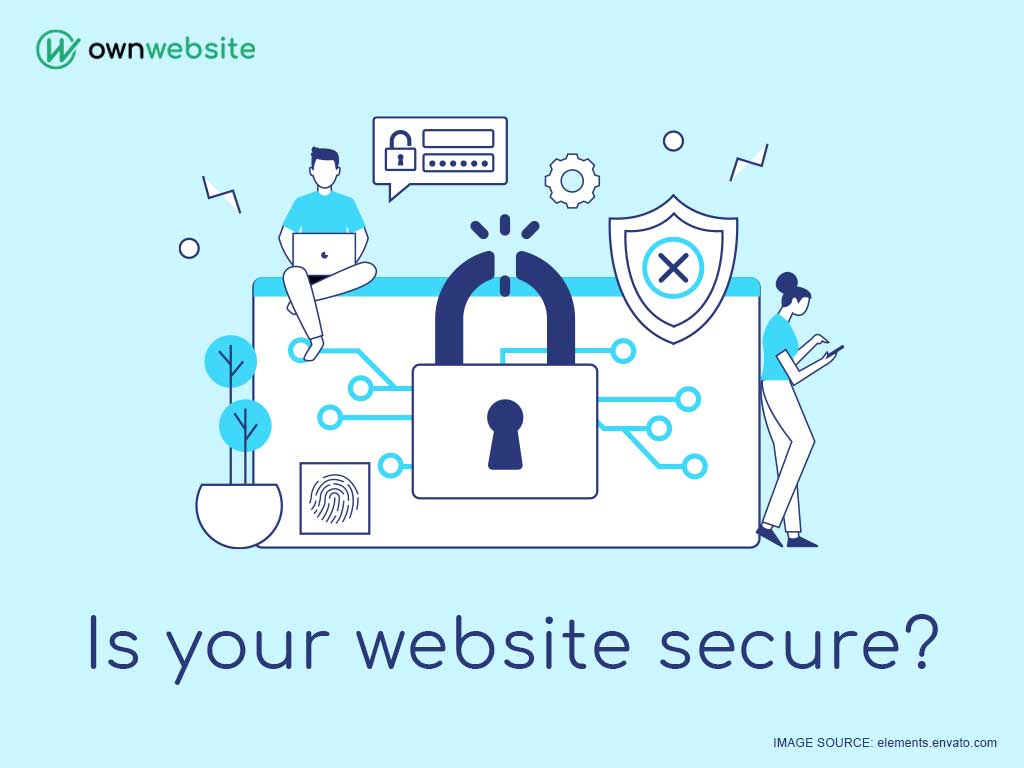There are common website security issues you should beware of. For example, Malware attacks, Password attacks, DDoS attacks, SQL injection, Interception attacks, Security misconfiguration, Cross-Site Scripting and Sensitive Data Exposure. You can read more about these website security issues in our easy guide to keep your website secure.
Never take your website’s security lightly. To help you with this, Ownwebsite’s website builder is completely automated and eCommerce ready with supreme security.
What role does SSL certificates play?
Verifying if you have an SSL Certificate installed on your website is the easiest way to check your website’s security. SSL Certificates are easily identifiable embedded as a padlock icon in the address bar to the left of the domain.
A website with a valid SSL will also begin with https:// rather than with http://. This shows that your website has an SSL Certificate installed correctly and it is secure. It’s always worth checking each page of your site as there are cases where images/links can cause the page to be insecure.
If you notice your site isn’t secure you will see in the URL bar that it says not secure or the http:// part of the domain may be in red. Having a secure website is highly recommended nowadays and you need to maximize your website’s security as soon as possible.
For more ways we keep your website secure to stand up against the aforementioned issues read about it here.
Is my website secure quiz?
How safe is your website?
Take this quiz to find out how secure your website is against online threats such as malware and DDoS attacks. Then get recommendations to improve website security.
1. Is your website secured with an SSL certificate?
A. No. What’s an SSL certificate?
B. I don’t know
C. Yes, my website is encrypted with HTTPS protection.
2. Are built-in security features included in your web hosting plan?
A. Maybe there are some, I’m not sure
B. I haven’t checked
C. Yes, my web hosting company provides 24/7 security monitoring and DDoS protection.
3. Does your website have a strong password?
A. My password is “password”
B. Yes, but it’s the same password I use on other accounts and with other website users.
C. Yes, to log into the backend, my website requires a strong, unique password for each user.
4. Do you make regular website backups?
A. I’ve never backed up my site
B. I back up my site every few months or so
B. Yes. I use a tool or service that makes daily backups of my website files and/or database and stores them securely in the cloud. I can restore my website quickly if necessary.
5. Is your website scanned for malware regularly?
A. Nope. My site is too small to get targeted with malware.
B. Yes, I sometimes use a malware scanning tool to check my site for suspicious activity.
B. Yes. I use a tool or service that runs daily malware scans, including at the server level, and removes malware when it’s detected.
6. How do you collect contact information from customers on your website?
A. I don’t collect customer contact information on my website.
B. I use contact forms to collect customer information but I don’t have an SSL certificate.
C. My website is secured with an SSL certificate so the customer information that I collect using contact forms on my site is encrypted.
7. Are you using a security plugin on your WordPress website?
A. No. Do I need one?
B. I don’t have a WordPress website.
C. Yes, installing a security plugin was one of the first things I did after installing WordPress.
8. Do you update your WordPress site’s core software, plugins and themes?
A. No. Shouldn’t my web host be responsible for all WordPress updates?
B. I don’t have a WordPress website.
C. Yes. I use my WordPress dashboard to keep tabs on updates and make the updates as needed. I back up my site and/or use a staging site before updating WordPress.
9. Is your website connected to Google Search Console?
A. What is a Google Search Console?
B. Yes, my site is connected to Google Search Console but I didn’t know it checked for security issues.
C. Yes. My site is verified on Google Search Console so I can use this tool to keep tabs on malware and spam alerts from Google.
10. Is your website protected with a web application firewall (WAF)?
A. I don’t know what a WAF is
B. No.I think my website is too small to require a firewall.
C. Yes. I have a cloud-based firewall service that screens and protects my website traffic from DDoS and SQL injection attacks, comment spammers and other threats.
Answer Key:
The answers to the questions A, B, C is C for all ten questions.
Be sure to fill in any gaps you may be missing to ensure both you and your patrons are secure.
Conclusion
If you got at least more than half of the responses correct, you are on the right track to proper website security.
OwnWebsite.Com is a pioneer in the website building market. We always stay ahead of developing trends and to provide the best tools on the market to our customers. We provide daily back-up on our server to ensure that your website is always secure! Choose your plan to start your dream site or speak to website builder expert to find out the best plan for your project.
